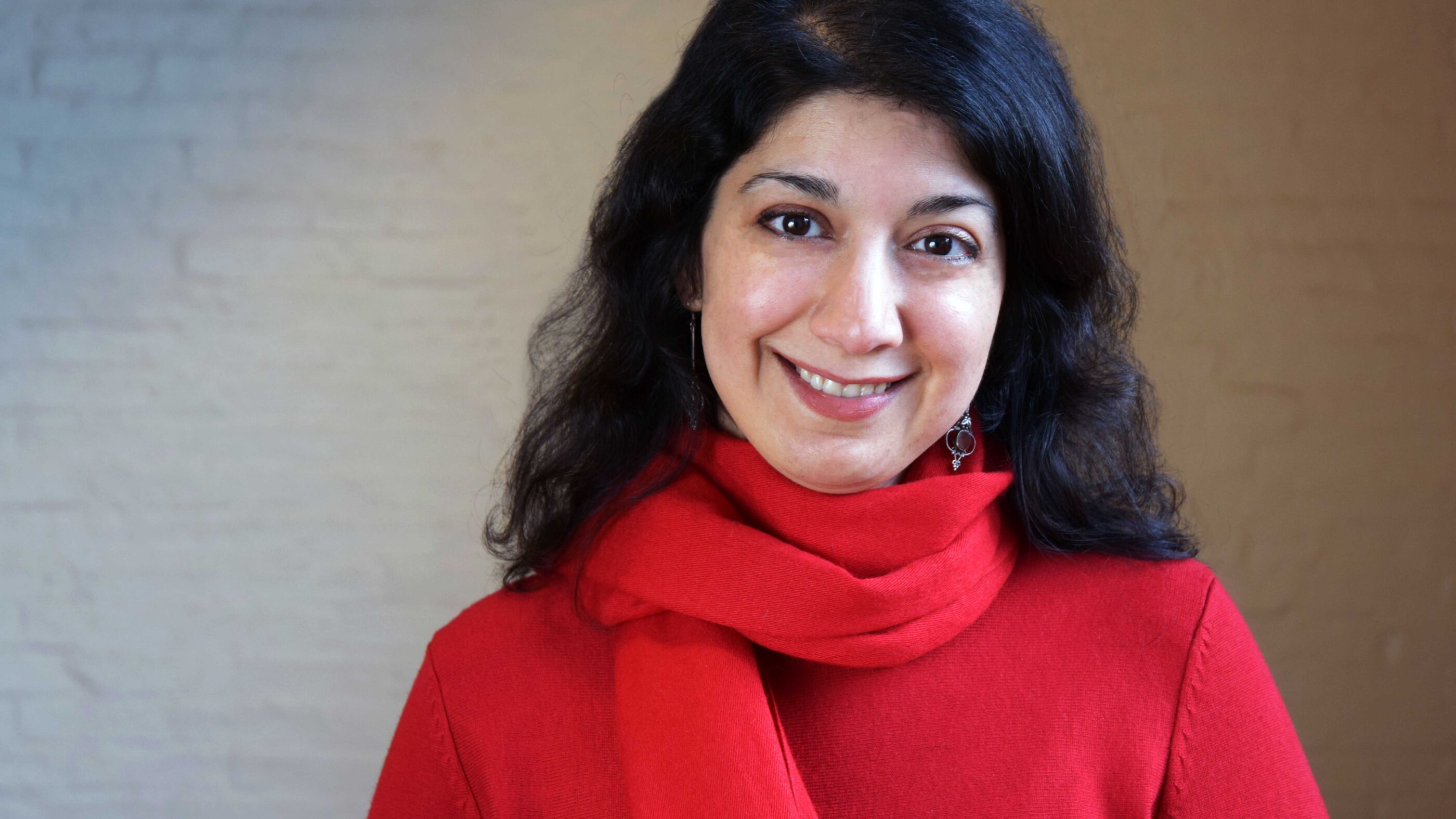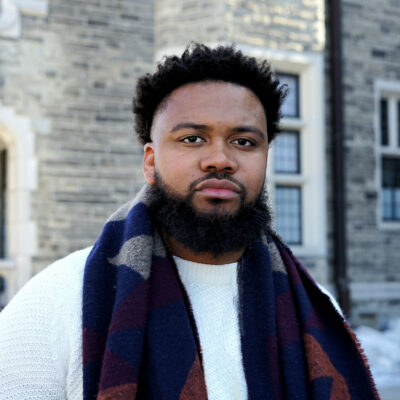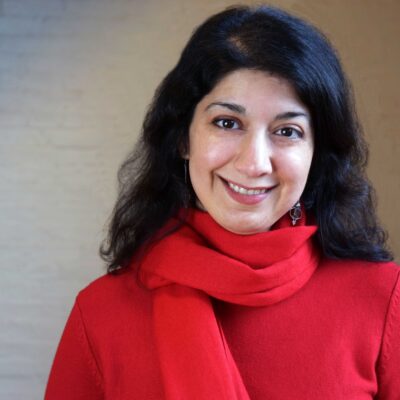A Q&A with Dr. Homayra Ziad, the new Board President of the ACLU of Maryland
(ABOVE: Q&A with Dr. Homayra Ziad, new Board President of ACLU Maryland - Interview Highlights Video)
Dr. Homayra Ziad is a scholar, activist, educator, writer, and recently elected President of the ACLU of Maryland’s Board of Directors. Dr. Ziad sat down in a one-on-one interview with Nehemiah Bester to discuss her vision for the future of the organization and how spirituality, community, and education are central to the strategy of fully realized racial equity. Here are highlights from the full interview.
Bester: Dr. Ziad, thank you so much for joining me today, and congratulations on your recent election as president of the board. I want to start by asking, can you tell me about your experience with the ACLU of Maryland and what made you want to be a part of the organization?
Ziad: So, you know it's interesting I'm not a lawyer, I always start with that. I’m an educator, I'm a professor, I'm an advocate for communities that I've worked in. But I've always had a deep fascination with the law and how the law creates and reflects social change. Whether we're talking about the desegregation of our schools, whether we're talking about women's bodily autonomy, whether we're talking about marriage equality, voting rights. And I'm also really familiar with the limits of the law. How the law is applied in ways that severely impact communities that have traditionally been marginalized, when the law is applied in the absence of grassroots organizing and pressure on powerful institutions. I think of the ACLU's move towards broadening its activism beyond litigation by pulling in and working alongside rather than for or on behalf of impacted communities.
Centering race equity as a foundational value of the organization and then drawing in organizers and activists and educators, for me has made the ACLU a far more welcoming space for folks who are not lawyers but for folks who have been working alongside and supporting lawyers for such a long time and creating the circumstances and the social space for the law to do the job that it's supposed to do, which is provide equity and access to civil rights and civil liberties for all. That also created the circumstances for someone like me to come into leadership roles at the ACLU and for that, I'm deeply grateful.
Bester: That’s amazing to hear. I want to touch on a few things that you pointed out because it sounds like you’re collaborating with two important topics: spirituality and social justice, while centering race equity. I’ve done some reading on you, and you’ve done an incredible amount of faith-based work, in addition to the plethora of other fields you are immersed in. How is your spirituality significant in your social justice work?
Ziad: So, for me as a Muslim woman, I do identify as a spiritual person, and I understand spirituality as unearthing a source of immense power that lies within every one of us. That is the power to perceive beyond ordinary human perception. We have resources within us that we can access to make this world a better place and to make ourselves better people. And I believe that access, that source of power is the source of creativity, imagination, and vision that we can enact in our communities. We need to know ourselves deeply, we need to fix what is broken, we need to heal ourselves and in that healing, we are healing those around us. I grew up with a mom who was a Marxist and a political activist in Pakistan, and I grew up with a father whose family was deeply embedded in the mystical traditions of Islam in spiritual ethics and poetry, and literature. My mom always connected God to justice and this activist ethic when working in the world and my dad always spoke about unearthing the beauty that lies within us – self-reflection, meditative practice, and self-awareness. Each of those commitments to knowing and working with others and a commitment to knowing and working with myself I think is fundamental to healthy activism. My spirituality is fundamentally based on love and by that, I mean loving others and oneself and creating a world in which we are all thriving.
As a Muslim, I center the inherent dignity and potential of every human being in everything I do. But often we are so traumatized by our experiences that we shoot down that access to that divine light. In Qur’anic ethics, the heart of injustice is the inability of the person who's had their rights taken away, who's had their liberties taken away, the inability of them to fulfill in their fullness their covenant with God. So, these are certain conditions that stand in the way of human autonomy and dignity, and these are oppression, exploitation, compulsion, and destruction of life, are all laid out in the scripture that I am so connected to. We live in a world where the vast majority of humanity is laboring under conditions that make it almost impossible to fulfill that covenant. To see the beauty that lies within because we are laboring under conditions of deep distress and oppression.
Bester: I love what you just said because you’ve been doing a lot of that same work, particularly providing voices for Muslim women. And when you mentioned the beauty, creativity, and the love, you’re extremely passionate about this. I also know that you’ve been a core member of 99 Clay Vessels: The Muslim Women Storytelling Project – which centers around the stories of Muslim women with visual arts, poetry, and various other experiences. What does that dialogue, that series, and the project itself mean to you and the work you are putting forward?
Ziad: Yeah, that has been an incredibly meaningful project that was created by one of my dearest friends Alison Kysia. She and I have been working together for many years on different kinds of projects that centered the voices of Muslim communities. This came out of an experience that she and I both shared of deep Islamophobia in an organization in Baltimore that we eventually left. So, she created these 99 clay vessels. She kind of poured her energy, her anger, her frustration into art. She created these to represent the 99 names of God in the Islamic tradition and the 99 different attributes of God. These are the divine attributes that manifest in the world as a way in which we human beings relate to God. These are spaces of creativity that we have access to in order to manifest them and create our own destiny.
We started working together thinking, “okay well what do we do with these vessels what can these vessels carry?” because they carried her pain, they carried her frustration. And then we said, “what if they can carry the stories of Muslim women justice activists?” The women who had been on the front lines of social change in their communities for the last 20 years. Through the arc of the War on Terror, through all the ways in which our communities have been marginalized, policed, and surveilled. When we talk about Muslim communities we're talking about an incredibly diverse group of people. We're talking about a community that is approximately 30% South Asian, 30% African American, 20% Arab, and multiple other ethnicities and cultural traditions. It’s the most racially and ethnically diverse religious community in the United States. So, what do we do to give voice to folks who, and especially women who bear the brunt of Islamophobia in very different ways, especially women who visibly show as Muslim? They're not just bearing the brunt of Islamophobia but also a certain type of misogynist Islamophobia that takes aim at what they wear on their bodies in addition to combating racism and misogyny within the Muslim community. There are so many ways that these women are working on different front lines and so these were the stories that needed to be given voice to because they are stories that don’t get told. So, yes, it's been a very meaningful project.
Bester: So, with that project itself and with your time at the ACLU of Maryland, I’m sure a lot of that has sort of soaked itself into your work. Are there any recent or current issues or cases that have meant the most to you, anything that you are most proud of, and why?
Ziad: I mean God there's so much to choose from. But I have to say that as an educator and as a parent with children in Baltimore City Public Schools, it's been the ACLU's commitment to safe and equitable public schooling. I have a deep commitment to ACLU's mission to have a public education system where every single student can learn, thrive, and is also prepared to effectively engage and impact change in their communities. The passing of the Blueprint for Maryland's Future was a landmark achievement, but to move the money and to move it with a focus on race equity, to move it with a focus on the wealth gap. We don't have enough mental health counselors, we don't have enough resource teachers, and we literally have cabinets falling off walls. It’s still about 70% of kids from lower-income backgrounds and the way that Covid has ravaged families and the way we have teachers working with students who are in their classroom who might be at like five different grade levels. And teachers are handling that without adequate support for students who need resources like IEPs (individualized education plans).
There is so much that needs to be done to move the money to places where we can get overall funding equity because, frankly, a majority of Black and Brown school children and folks who live in low wealth areas are not attending schools that are even remotely adequate for their needs and their dignity. The schools are unhealthy, they're unsafe, and the teachers are trying as hard as they can to stay focused and loving in the middle of circumstances where they are not getting the resources they need. So that is a place where my heart is and I hope and pray that as the board president of the ACLU, which is a huge undertaking that I don't take lightly, that we as a board can be empowered to impact that space. To work and mobilize our communities to realize and understand that the education of our children, I mean that’s it.
Bester: I want to go to that quickly because you were recently elected as the board president of the ACLU of Maryland after doing tremendous work throughout your tenure and serving as vice president. What is your vision for the ACLU of Maryland in the coming years?
Ziad: For me as an educator I understand leadership as more of a guiding hand and a light touch. I think that we all have the resources within the board to be able to affect and impact change in the organization. As president, my role is to empower the board to make sure that we make good on our organization's mission to empower all Marylanders to exercise their rights so that the law values and uplifts their humanity. I worked on the Strategic Planning Committee of the ACLU of Maryland and the vision for my presidency is to build upon this work, and that is bringing the board into alignment with the strategic plan that's created by the staff. To move us, the board, as a group of individuals to a critical stakeholder relationship with the organization, because this board is unlike any we've had in the history of the ACLU of Maryland. It is one of the most diverse in all ways, including in what we do. And we have this historical opportunity to pull in many new communities into the work of the ACLU. Right now, the goal is to operationalize the board to make it a governing board with a fundraising capacity and with the capacity to mobilize communities.
The board and staff have also both wanted to work more closely with one another. For the individuals on the board, not only do we have access to new communities, but we also have access to skills and resources and the ability to pull in folks that will support and impact the work of the organization, and the work of the staff. And so how do we best bring those resources, communities, and all the different skills to bear in ways that move forward all the strategic priorities of the organization? That to me is critical. To get the board to start mobilizing their communities and move the needle forward on all these strategic priority issues that the ACLU of Maryland has put forward in its strategic plan is incredibly exciting. It's vast and it opens the space to impact the lives of all Marylanders and that is what I'm committed to as the board president.
Bester: I am thrilled to hear you say that. I’m excited just hearing about your vision and the platform you want to move the ACLU forward with. And I want to thank you again for your time and for giving us a chance to learn more about you and your mission.
Ziad: Thank you.
(BELOW: Q&A with Dr. Homayra Ziad, new Board President of ACLU Maryland - Full Interview Video)



